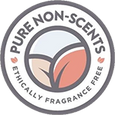Chemical Irritants In Hair and Skincare
Many overly-scented people in our lives are attempting to appeal to the senses, they often don't understand that fragrance can be a sensory assault.
As more and more people suffer side effects from artificial fragrances, it's become clear that our super-scented society creates a huge problem for those among us who are sensitive to smells. Worse, efforts to block fragrances — along with products falsely advertised as unscented — can often create additional issues. Let's take a closer look at fragrance issues: why it's a problem, why "unscented" is sometimes a stretch of the truth, and where to find truly fragrance/scent-free, chemical-free products.
Chemical Fragrances are Everywhere. It's easy to think of the usual culprits when it comes to fragrance: perfume, cologne, and deodorants come to mind immediately. However, those who are sensitive to scents or suffer from Multiple Chemical Sensitivities (MSC) have learned firsthand that fragrance can be found in a variety of products:
It's a laborious task to find personal hygiene items that are free of heavy fragrances, which is an issue when it comes to shopping — and also when it comes to smelling other people's heavily-scented products in public.
Though you might assume that products used on facial skin would have higher standards, many facial creams, cleansers, and cosmetics have strong odors from chemical additives.
If you wash clothes in a laundromat, you've already been exposed to the extreme chemical scent of many detergents. Even at home, it can be hard to find products that are truly scent-free.
Is it the Smell or the Chemicals? Although government agencies are responsible for ensuring safety in many household and cosmetic products, some of the standards for safety are dubious at best. For the most part, companies that provide fragrances for everyday products are members of the International Fragrance Association (IFRA), which allows for a pretty extensive list of additives that show up in fragrances.
Some of these chemical additives can trigger serious side effects in individuals who are sensitive to chemicals or have respiratory conditions like asthma. For example, fragrance sensitivities or chemical allergies can cause headaches, sneezing, runny nose, tightness in chest, difficulty breathing, and rashes on the skin. Others may experience serious fatigue and fogginess that detracts from their ability to function at work or at daily activities.
It's unclear exactly what causes fragrances to act as irritants for certain individuals. For some, their symptoms might be a reaction to the scent itself. But for others, side effects could indicate an allergy to the many chemical compounds that are used to create different scents used in common products. That's why even products labelled as "unscented" can cause problems.
Are “unscented products always the answer?” In response to the demand for products that don't overwhelm the senses, some major companies have started marketing fragrance blockers in addition to their other offerings. These "unscented" products give the impression of being a safe alternative for those with chemical sensitivities — but in many cases these products are loaded with harmful chemicals themselves.
As a consumer, it can be difficult to sort through the wording on different products. For example, "fragrance-free" technically only means that no chemical additives are added to a product, but companies can still use scented oils to give the product a smell. This means that fragrance-free products can still trigger a reaction in people who are sensitive to a particular scent.
The phrase "unscented" just means you won't be able to detect a smell — not that it's free of chemicals that can trigger sensitivities. And many products that are specifically marketed to eliminate or mask odors actually contain their own chemical fragrances. In addition, many contain harmful preservatives and additives that can trigger a response in sensitive individuals.
When it comes to using "fragrance-free," "unscented," or fragrance-blocking products, it's important to do a little inquiry. Are these products actually free of any scents? Are they masking unpleasant smells with chemical additives? Most importantly, are they simply adding more toxins to the air that we breathe? Sadly, some of these questions cannot be answered due to label laws that don’t require an ingredient list for fragrances.
Check ingredients labels for items like "fragrance" (which could mean a plethora of different chemicals), phenoxyethanol (a preservative known for irritating the skin and lungs), and parabens (disruptive to the endocrine system and reproductive system).
Fighting Back Against Sensory Assault
Sensitivity to scents is a real issue that's recognized by medical and governmental agencies. In fact, the American Academy of Dermatologists considers fragrances to be the highest contributor to contact dermatitis — a red, itchy skin rash. And the Canadian Human Rights Commission acknowledges that chemical sensitivities constitutes a disability in sufferers.
It's important for employers, educators, and business owners to understand that sensitivity to fragrances —and more importantly, the chemicals that create those fragrances — is a real issue that affects people in a variety of ways.
At Pure Non-Scents, we provide hair, body, and face products that are purely non-scented and fragrance free. That means we've eliminated the harmful chemicals found in many "unscented" products. Using plant based natural ingredients instead of chemical additives allows us to create products that nourish and soothe instead of irritate. Want to learn more? Please feel free to contact us today.
Pure Non-Scents Ltd. TM
